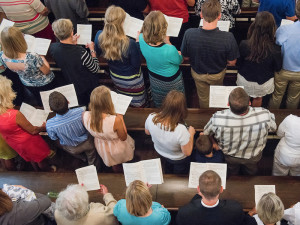by Rev. Dr. Mark Birkholz

Martin Luther’s hymns were vitally important to the Reformation. They presented the gospel in beautiful, memorable ways that people could understand in their own language.
One of Luther’s earliest compositions was “From Depths of Woe I Cry to Thee,” a paraphrase of Psalm 130 (Aus tiefer Not schrei’ ich zu dir, LSB 607). He wrote this hymn in 1523, around the time that he was revising the Latin Mass. Near the end of the year Luther wrote a letter to George Spalatin, the court chaplain to Elector Frederick the Wise and encouraged Spalatin to compose German hymns based on the Psalms. He enclosed “From Depths of Woe” as an example. Little did Luther know that a few short years later in 1525 that same hymn would be sung at Elector Frederick’s funeral. It was also sung at the funeral of Frederick’s successor, Elector John the Steadfast, in 1532.
When the Diet of Augsburg was in session in 1530, it was not safe for Luther to be there in person, so he had to wait at Coburg for news of the proceedings. Luther was worried about the proceedings, and reportedly gathered the servants together saying, “Come, let us, despite the devil, sing Aus tiefer Not schrei’ ich zu dir and thereby praise and glorify God.”
Luther died in Eisleben on February 18, 1546. His body was brought to Wittenberg for burial, and on February 20 the funeral processional made a stop in the town of Halle. As Luther’s body lay in state in the Church of Our Dear Lady this hymn was sung.
The text of “From Depths of Woe I Cry to Thee” focuses on the sorrow we feel for our sins, and our hope in the forgiveness of Christ. It begins in the depths of despair that Luther himself felt as he was in agony over his sinfulness. The hymn continues by emphasizing that we can do nothing to earn God’s forgiveness, but God’s mercy towards us is a free gift. The final stanza expresses trust that the grace of God is greater than our sins, and that He will redeem us in the end.
The fourth stanza is my favorite, as it speaks of how we often have to wait for the Lord. Here Luther is reflecting on Psalm 130:5-6, “I wait for the Lord, my soul waits, and in his word I hope; my soul waits for the Lord more than watchmen for the morning, more than watchmen for the morning.” (ESV) The hymn stanza reminds us that we wait in hope because we are God’s children and He will not forsake us.
“From Depths of Woe I Cry to Thee” (LSB 607)
1 From depths of woe I cry to Thee,
In trial and tribulation;
Bend down Thy gracious ear to me,
Lord, hear my supplication.
If Thou rememb’rest ev’ry sin,
Who then could heaven ever win
Or stand before Thy presence?2 Thy love and grace alone avail
To blot out my transgression;
The best and holiest deeds must fail
To break sin’s dread oppression.
Before Thee none can boasting stand,
But all must fear Thy strict demand
And live alone by mercy.3 Therefore my hope is in the Lord
And not in mine own merit;
It rests upon His faithful Word
To them of contrite spirit
That He is merciful and just;
This is my comfort and my trust.
His help I wait with patience.4 And though it tarry through the night
And till the morning waken,
My heart shall never doubt His might
Nor count itself forsaken.
O Israel, trust in God your Lord.
Born of the Spirit and the Word,
Now wait for His appearing.5 Though great our sins, yet greater still
Is God’s abundant favor;
His hand of mercy never will
Abandon us, nor waver.
Our shepherd good and true is He,
Who will at last His Israel free
From all their sin and sorrow.
Much of the information for this post was taken from these two sources:
Polack, W.G. The Handbook to the Lutheran Hymnal. St. Louis: Concordia, 1942.
Precht, Fred L. Lutheran Worship Hymnal Companion. St. Louis: Concordia, 1992.
The Rev. Dr. Mark Birkholz is pastor of Faith Evangelical Lutheran Church, Oak Lawn, IL.